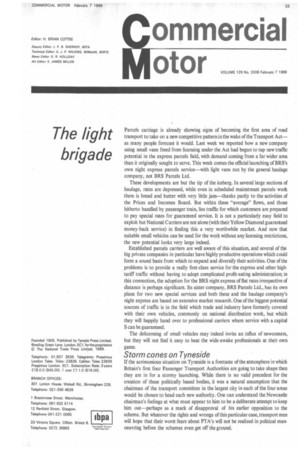ommercial ()tor
Page 35

If you've noticed an error in this article please click here to report it so we can fix it.
Parcels carriage is already showing signs of becoming the first area of road transport to take on a new competitive pattern in the wake of the Transport Act— as many people forecast it would. Last week we reported how a new company using small vans freed from licensing under the Act had begun to tap new traffic potential in the express parcels field, with demand coming from a far wider area than it originally sought to serve. This week comes the official launching of BRS's own night express parcels service—with light vans run by the general haulage company, not BRS Parcels Ltd.
These developments are but the tip of the iceberg. In several large sections of haulage, rates are depressed, while even in scheduled mainstream parcels work there is bread and butter with very little jam—thanks partly to the activities of the Prices and Incomes Board. But within these "average" flows, and those hitherto handled by passenger train, lies traffic for which customers are prepared to pay special rates for guaranteed service. It is not a particularly easy field to exploit but National Carriers are not alone (with their Yellow Diamond guaranteed money-back service) in finding this a very worthwhile market. And now that suitable small vehicles can be used for the work without any licensing restrictions, the new potential looks very large indeed.
Established parcels carriers are well aware of this situation, and several of the big private companies in particular have highly productive operations which could form a sound basis from which to expand and diversify their activities. One of the problems is to provide a really first-class service for the express and other hightariff traffic without having to adopt complicated profit-eating administration; in this connection, the adoption for the BRS night express of flat rates irrespective of distance is perhaps significant. Its sister company, BRS Parcels Ltd., has its own plans for two new special services and both these and the haulage company's night express are based on extensive market research. One of the biggest potential sources of traffic is in the field which trade and industry have formerly covered with their own vehicles, commonly on national distribution work, but which they will happily hand over to professional carriers where service with a capital S can be guaranteed.
The delicensing of small vehicles may indeed invite an influx of newcomers, but they will not find it easy to beat the wide-awake professionals at their own game.
Storm cones on Tyneside
If the acrimonious situation on Tyneside is a foretaste of the atmosphere in which Britain's first four Passenger Transport Authorities are going to take shape then they are in for a stormy launching. While there is no valid precedent for the creation of these politically based bodies, it was a natural assumption that the chairman of the transport committee in the largest city in each of the four areas would be chosen to head each new authority. One can understand the Newcastle chairman's feelings at what must appear to him to be a deliberate attempt to keep him out—perhaps as a mark of disapproval of his earlier opposition to the scheme. But whatever the rights and wrongs of this particular case, transport men will hope that their worst fears about PTA's will not be realized in political maw oeuvring before the schemes even get off the ground.












































































































































































